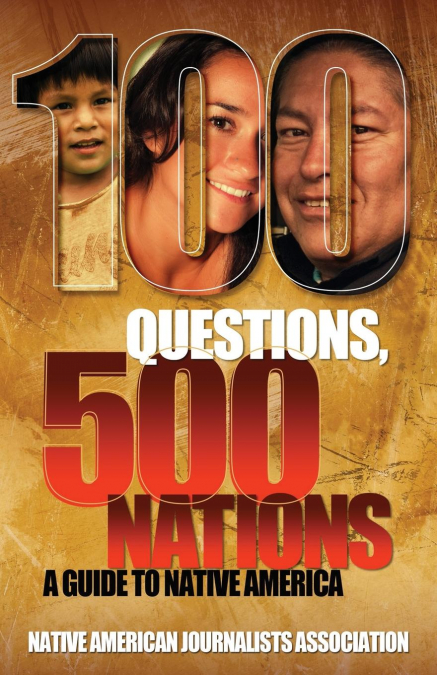
Michigan State School of Journalism / Native American Journalists Assn
 Donde los libros
Donde los libros
 Librería 7artes
Librería 7artes
 Librería Elías (Asturias)
Librería Elías (Asturias)
 Librería Kolima (Madrid)
Librería Kolima (Madrid)
 Librería Proteo (Málaga)
Librería Proteo (Málaga)
*100 Questions, 500 Nations: A Guide to Native America* is by the Native American Journalists Association as part of the Michigan State University School of Journalism series in cultural competence. This guide has sections on tribes, reservations, sovereignty, treaties, federal offices, casinos, education, language, religion and culture. The guide is intended for people in business, schools, places of worship, government, medicine, law enforcement, human resources and journalism-anywhere it is important to know more about communities. We hope this guide works for individuals who just have questions about the people around them.Questions include: Who is an American Indian? Where did American Indians come from originally? Why are native peoples referred to as Indians? Which is correct: American Indian or Native American? How many American Indians and Natives are there? What are the reasons for rising population? Why does the government refer to most indigenous people in Alaska as Alaska Natives instead of as American Indians? Are Native Hawaiians considered American Indians? What is a tribe? How many tribes are there? Which is the largest tribe? Are Indian tribes and Indian nations the same? What powers do the tribes, as nations, hold? What kind of governments do the tribes run? What is the tribal council? What is a reservation? Why is it called a reservation? How many American Indians live on reservations? How much land do tribes hold? What is Indian Country? What are the living conditions in Indian Country? What is tribal sovereignty? What is sovereign immunity? Do states have jurisdiction over American Indians or their land? Do American Indians have to obey the same laws as non-Indians? Are Indian Americans U.S. citizens? Can American Indians vote? Do Native Americans pay state or federal taxes? What are treaties? What agreements did the treaties contain? Why did European settlers enter into treaties with the tribes? Why did the tribes agree to the treaties? Are Native Americans affected by the Affordable Care Act? Are treaties still valid? Do treaties grant Native Americans special rights today? Are treaties being challenged? What organizations represent tribal interests? What does the Bureau of Indians Affairs do? Do American Indians have the right to hold elective office? Do Native Americans serve in the U.S. armed forces? Who regulates Indian casinos? Do all tribes have casino gambling? Do the tribes pay taxes on their revenues? Are individual tribes getting rich from casinos? How do tribes use gaming revenue? Why are Indian casinos a popular enterprise among the tribes? Do all American Indians favor gaming? What is a tribal school? How many American Indian students attend public schools off the reservation? How many American Indians are high school graduates? What is a tribal college? How do graduation rates for American Indians compare with the general population? Do Native Americans get a free college education? Do American Indians speak their own language? How many American Indian languages are still spoken? Which are the most common languages? Were there written Indian languages? What is being done to preserve American Indian languages? Is there an American Indian religion? How many American Indians identify themselves as Christians? 3